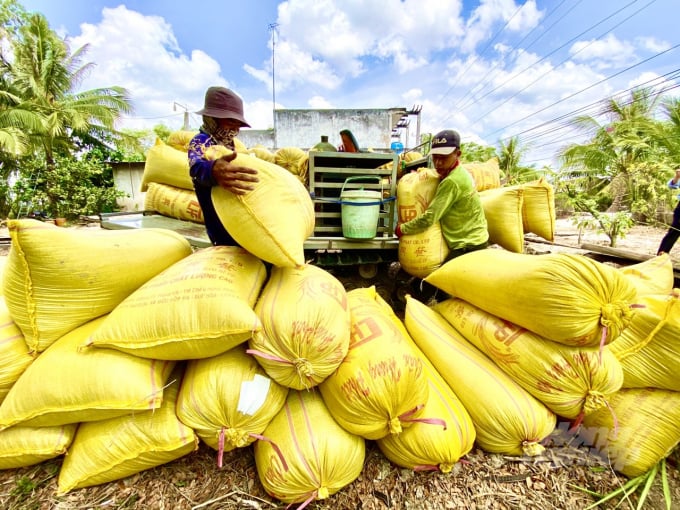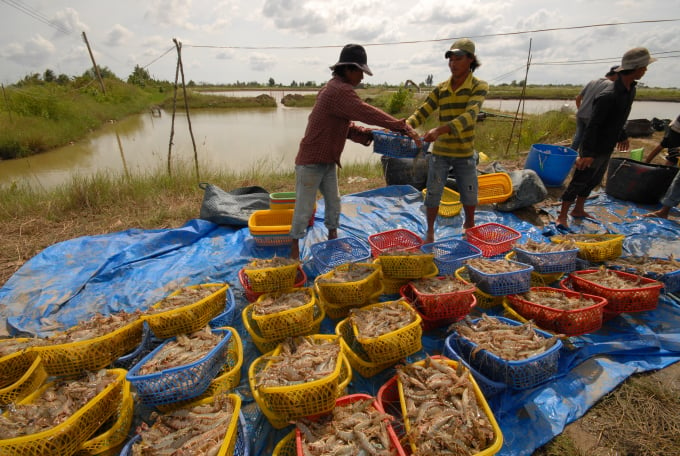June 19, 2025 | 20:15 GMT +7
June 19, 2025 | 20:15 GMT +7
Hotline: 0913.378.918
June 19, 2025 | 20:15 GMT +7
Hotline: 0913.378.918
Resolution 120 was issued in November 2017, for the first time orienting the Mekong Delta's agriculture to focus on fisheries, fruit trees, and rice with cooperatives playing an important role. In particular, it identified that the highlight of agriculture should be economic efficiency, not output. In the Mekong Delta, agriculture had for a long time been mainly focused on rice production so it was just understood as rice farming until 2018 when Decree 98/2018/ND-CP was issued defining that agriculture included cultivation, animal husbandry, fisheries, forestry, and salt production.

Today, agricultural transformation is clearly much more challenging since it's not just about converting rice production to other crops and livestock. Photo: Le Hoang Vu.
A policy on empowering direct producers has so far helped improve agriculture rapidly in both quantity and quality but the driving force that can make the most powerful agricultural transformation today may be in the opposite direction. That means farmers have the right to use the land but could not decide what crops and livestock to be raised in their own fields. Then a cooperative model is undertaken. In general, this model has not done a good job in managing, organizing, and leading production, so it leaves skepticism in the farming community.
A policy on empowering for direct producers can so far has helped rapidly improve agriculture in both quantity and quality but the driving force that can make the most powerful agricultural transformation today may be in the opposite direction. That means, the person who has the right to use the land but could not decide what crops and livestock to be raised on his own field. Then a cooperative model is set up. In general, this model has not done a good job in managing, organizing and leading production for members, so it leaves skepticism among the farming community.
When the French began to mechanize digging canals in the 18th century and especially, the goal of rice cultivation changed from food security to trading, the rice area in the Mekong Delta skyrocketed to 55%. This figure remained until the mid-20th century, sometimes even decreased due to the chaotic socio-political situation. In the 1960s with a wave of "green revolution", the Mekong Delta first introduced short-day rice varieties IR5 and IR8 along with chemical fertilizers and pesticides.
So, despite suffering from the fierce war until 1975, the rice area increased by 72% along with the output, thanks to an increase from one rice crop to two rice crops a year. In the first years after liberation, although the whole society mobilize all efforts to grow rice including the implementation of an "irrigation duty" policy, expanding state-owned farms into uncultivated zones, establishing production corporations, etc, the rice cultivation area could not increase significantly. Rice production was even reduced seriously, pushing Vietnam out of the group of rice exporters in the world.
When the doi moi policy was launched in 1985, the land was handed over to people for production. Although rice areas did not increase significantly, rice production skyrocketed, this helped Vietnam return to the group of rice exporting countries in 1989. Moreover, Vietnam integrated with the world economy, so rice production had more motivation to boost its economic development.
It can be seen that since 1995, cultivators have been producing based on the market signs. It means they regard economic goals as the focus of their cultivation from selecting seedlings to the production process. Various farming models such as rice-shrimp raising, aquaculture, and fruit cultivation in fresh and saltwater have been implemented.

The implementation of the rice-shrimp model adapting to climate change is being developed strongly in the Mekong Delta. Photo: Le Hoang Vu.
Income from these transformational models has far exceeded those of rice farming. And perhaps these "practical models" have created an opportunity for Resolution-120 to be born in 2017, with priority given to fishery, fruit trees, and then rice. It is possible to summarize the effects that change agriculture from the area, productivity, output, types of crops, livestock, and economic efficiency, including social organization, abundant labor force, mechanization, modernization, application of science and technology, and land policies, and market expansion. These effects can be seen as the main driving force behind the rapid agricultural transformation.
Among these dynamics, changes in land policy have helped speed up the agricultural transformation the most, both positively and negatively.
Analyzing unsuccessful cases in the past time, a main reason is found due to the cooperatives' management capacity and operation policy. If the co-operative's management board is good at expanding markets, finding business partners, building regulations and organizing production, ensuring stable jobs, and generating income significant for members, farmers will not hesitate to hand over their right to select crops and livestock to the management board. Therefore, currently, building capacity for the cooperative management board will affect most rapidly and effectively on agricultural transformation!
Translated by Linh Nguyen
![Turning wind and rain into action: [9] Digitizing hydrometeorological data in response to climate change](https://t.ex-cdn.com/nongnghiepmoitruong.vn/608w/files/news/2025/06/17/z6704423696987_15fd32ffc26d590d204d520c9dac6786-nongnghiep-165943.jpg)
(VAN) Farmers have begun accessing hydrometeorological applications to adjust their cropping schedules, aiming to ensure productivity and adapt to climate change.
![Turning wind and rain into action: [8] Real-time salinity detection and early warning technology](https://t.ex-cdn.com/nongnghiepmoitruong.vn/608w/files/news/2025/06/17/z6704423696987_15fd32ffc26d590d204d520c9dac6786-nongnghiep-151127.jpg)
(VAN) Thanks to the integration of modern hydrological-hydraulic models, remote sensing technologies, and artificial intelligence, the accuracy of hydrological forecasting has significantly improved.
![Turning wind and rain into action: [7] Early disaster warnings help marine farmers minimize losses](https://t.ex-cdn.com/nongnghiepmoitruong.vn/608w/files/news/2025/06/17/z6704423696987_15fd32ffc26d590d204d520c9dac6786-nongnghiep-142942.jpg)
(VAN) In recent years, thanks to early disaster warnings and forecasting, marine farmers in Khanh Hoa province have been able to reduce risks and losses, thereby improving production efficiency.
![Turning wind and rain into action: [6] ‘Four on-the-spot’ disaster management software](https://t.ex-cdn.com/nongnghiepmoitruong.vn/608w/files/news/2025/06/17/e5a48259d6a262fc3bb3-nongnghiep-183800.jpg)
(VAN) By simply activating the scenario on the disaster management software, the relevant authorities immediately know how many households need to be evacuated, where to evacuate them to, and by what means of transportation…
![Turning wind and rain into action: [5] Hue applies modern technology in disaster forecasting](https://t.ex-cdn.com/nongnghiepmoitruong.vn/608w/files/news/2025/06/17/z6704423696987_15fd32ffc26d590d204d520c9dac6786-nongnghiep-093938.jpg)
(VAN) In Hue city, modern technology has recently been applied in meteorological and hydrological forecasting and warning, helping to reduce the damage caused by natural disasters.

(VAN) A cutting-edge farming technique being implemented on an experimental ranch in Arizona's Sonoran Desert has already saved a billion gallons of water over five years, according to Civil Eats.

(VAN) Poultry and pig production and the environment can be boosted through enhanced water technology, according to new research.